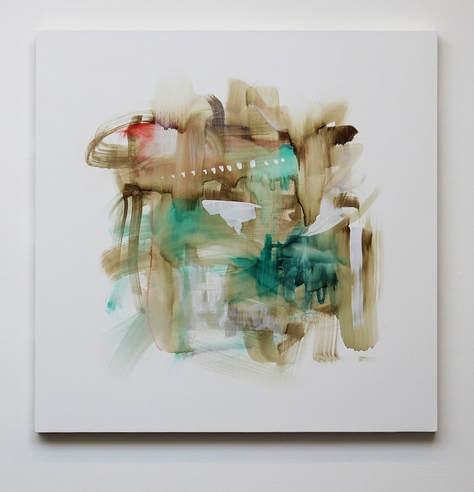diversity
 Joshua Backus, Untitled, Oil on MDF, 2016
Joshua Backus, Untitled, Oil on MDF, 2016
Because I view philosophy not simply as a discipline but as a way of life, my orientation to diversity, equity, and inclusion is necessarily informed by my philosophical commitments. This is primarily evinced by my commitment to being-in-the-world, a watershed concept in the phenomenological tradition. To be in a world is to be situated within a matrix of power and historically inherited context of meaning not within one’s control. Thus, my efforts to phenomenologically articulate the structural dynamics of human experience call for awareness of situation with respect to a whole range of determining factors: from spatial to social location, from ease of movement to equity of access to resources, and from the epistemic-imaginary landscapes of language to the impact of histories conditioning expectation and action.
Moreover, phenomenological methodologies enact a triple redemption I enthusiastically affirm – of (1) the otherwise consistently devalued body, of (2) lived experience founded on the body, and of (3) intersubjectivity. Speaking to silences in the history of philosophy in the global North, the body is, for phenomenology, situated in a world always already shared with others. That said, “the body” as I understand it does not signify “the Body,” the empty universal, lacking in particular content so as to be applicable to all. It signals the lived body, emphasizing the singularity of personal experience in this body – socially read as racialized, sexualized, ethnic, oriented to certain objects of desire, able to or restricted from moving in expected ways – even as we lay ethical claim to the human integrity that we each and all of us deserve. Finally, I appreciate that for phenomenology what counts as true depends on intersubjective corroboration, which is made all the more powerful by the testimonials of a diverse community. The world speaks; those with whom we share the world speak. The attentive phenomenologist cultivates the art of listening.
In the context of the classroom, cultivating the art of listening means recognizing the singularity of my students’ lived experience, the myriad ways in which they live their embodiment from out of situational contexts that make it more or less a matter of ease for them. It means accommodating accordingly, maintaining firm boundaries for learning objectives within differing calls for flexibility. A strategy to achieve this involves consistently deployed micro-assessments that target a diversity of learning styles and skill sets so as to reach the widest possible range of students, empowering them to succeed. Cultivating the art of listening also means executing lectures that rely on concrete examples to wed theory to experience in tandem with activities designed to draw from experience, opening a space where students are encouraged to share, thereby advancing our collective understanding. To combat the tendency to instrumentalize the voices of the marginalized in so-called “multicultural” milieu, I curate course texts that speak non-instrumentally to difference – i.e., texts that testify from and discern patterns in personal experience (that may or may not extend to my own). Teaching these texts demands deliberate negotiation of when to listen and when to speak up, whether in response to students’ provocations or by heuristically drawing attention to my own contradictory positionality as a marginalized Sephardic Jew sometimes read as brown, whose ethnicity is modulated by light skin privilege.
Finally, pedagogical cultivation of the art of listening must answer the ethical imperative to call out the notable absence in the “tradition” of attention to justice rather than simply to truth. I find this is best accomplished through an emphasis on narrativity, across all courses and themes my courses engage. What stories can we tell about “the” history of philosophy, or about “the” aesthetic tradition, or “the” feminist philosophers? How are these stories enriched by a diversity of testimonials from parts known and unknown? How are they haunted by the silences of trauma or non-recognition? Whatever the method, by taking a diversity of approaches to listening (and thereby engagement), I get to know my students better. Not only does the rapport I build with them then lay the groundwork for the kind of mentorship that nourishes confidence and sense of purpose for us all, but students tend to follow me from one course to another. This has the added effect of assisting efforts to recruit students to Philosophy.
All of this is predicated on building confidence, especially in my students who are underrepresented in the discipline and underserved by institutions including but not limited to the academy. Since SHSU is an HSI (Hispanic serving) and the students are majority first generation who face concrete challenges in equity of access to resources (and more), I devote considerable energy to advocacy and support.
In the last three years I have acted as mentor, Honors project supervisor, McNair scholar consultant, letter writer, and faculty sponsor of underserved students, and have modeled through community activism a deep commitment to coalition building that I make every effort to mirror through service to college and departmental committees focused on advancing the cause of diversity and inclusion. My work for community organizations like BLM-HAAIR (Huntsville Alliance Against Injustice and Racism) or No Home for Hate in Huntsville (which I co-founded), and for College committees like DivIn (Diversity and Inclusion) informs my approach to working with students both in and out of the classroom. Likewise, what I learn from working with my students I bring to the table in service to the community and in the attenuation of my research interests, which increasingly reflect my socio-political commitment to advancing the cause of a more just world.